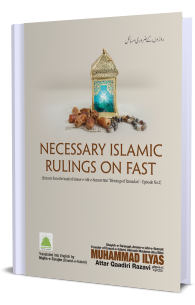
Questions and answers of Madani Muzakarah
1. Excessive workload and fasting
Question 1: What should a fasting employee do when his employer does not adjust the workload or schedule in Ramadan?
Answer: Employers should be considerate of Ramadan[1], but if they are not, even then the employee cannot forego even a single fast because of their workload. If your current employment interferes with fasting in Ramadan, then you should find a different employer. Anyhow, the obligatory fast cannot be missed due to work. (Madani Muzakarah, 2nd Ramadan-ul-Mubarak 1441 AH, After Taraweeh prayer)
2. Cutting hair while fasting
Question 2: Can a person have his hair cut while fasting?
Answer: Yes! A person can have their hair and skin cut while fasting. Sometimes, it is necessary to cut skin during surgery, for example. Neither of these acts invalidates the fast. Many similar, incorrect rulings are circulated among the public. In our childhood, we heard that people would gather saliva in their mouth while fasting and then spit it out, assuming that the fast would be invalided if they swallowed the saliva. This too is completely incorrect, (Madani Muzakarah, 2nd Ramadan-ul-Mubarak 1441 AH, After ‘Asr prayer)
3. Eating in the night post-intention
Question 3: Can I eat in the night after making the intention to fast?
Answer: It is permissible. You may eat and drink throughout the night after making the intention. The time for the intention of fasting begins after sunset. (Al-Jauharah-tun-Nayyirah, p. 175) Even if one made the intention during Maghrib Salah that he will fast tomorrow, the intention will be valid. (Durr-e-Mukhtar, vol. 3, p. 398; Madani Muzakarah, 2nd Ramadan-ul-Mubarak 1441 AH, After ‘Asr prayer)
4. Taraweeh after Witr
Question 4: If one forgets to pray Taraweeh, can he offer it after Witr?
Answer: There is no harm in praying Taraweeh after Witr. (Bahar-e-Shari’at, vol. 1, p. 689, derived from; Madani Muzakarah, 4th Ramadan-ul-Mubarak 1441 AH, After Taraweeh prayer)
5. Using henna or kohl while fasting
Question 5: Can one apply red henna or kohl while fasting?
Answer: Applying red henna or kohl has no impact on the fast, even if the kohl can be tasted in the throat after it is applied to the eyes. (Durr-e-Mukhtar ma’ Rad-ul-Muhtar, vol. 3, p. 421; Bahar-e-Shari’at, vol. 1, p. 982; Madani Muzakarah, 4th Ramadan-ul-Mubarak 1441 AH, After Taraweeh prayer)
6. The hair of Aqeeqah
Question 6: Should the money for the child’s hair which is cut in Aqeeqah be used in righteous causes or donated to charity?
Answer: Silver or gold in accordance to the weight of the hair of the child that is cut for Aqeeqah should be donated to charity. (Bahar-e-Shari’at, vol. 3, p. 355) and the hair itself should be buried. (Haashiya-tut-Tahtaawi alal Maraqi, p. 527, summarised; Bahar-e-Shari’at, vol. 1, p. 1144) The general rule for anything that is removed from the human body is that it should be buried and selling it is unlawful (Haraam). (Hidayah, vol. 1, p. 23, derived from; Madani Muzakarah, 7th Jumadal Ukhra 1441 AH)
7. Animal fighting
Question 7: Is it permitted to make chickens, pheasants, and dogs fight?
Answer: It is completely impermissible to participate in or watch animal fighting, whether it is chickens, pheasants, dogs, or something else. This is an abhorrent and sinful act. (See, Fatawa Razawiyyah, vol. 24, p. 655) Watching such exhibitions is a sin too. (See, Bahar-e-Shari’at, vol. 3, p. 512; Madani Muzakarah, 7th Jumadal Ukhra 1441 AH)
8. Treating evil eye
Question 8: If someone is affected by the evil eye, how can they be treated?
Answer: There are many ways to remove the effects of the evil eye. One method is to recite Surah Al-Falaq and Surah Al-Naas and blow on the affected person. اِنْ شَــآءَالـلّٰـه the effects of the evil eye will be removed. (Madani Muzakarah, 1st Muharram-ul-Haraam 1441 AH)
9. Ajwah as a name
Question 9: Can a girl be named Ajwah?
Answer: Ajwah is the most superior type of date of Madinah, in fact, it is the most superior date in the world. There is no harm in keeping a name based on this connection.
10. Du’a after burps
Question 10: What should be recited after burping?
Answer: Whenever a person burps, they should recite اَلْـحَمْـدُ لـِلّٰـه, because the burp was a hardship that was alleviated, hence, gratitude should be shown to Allah Almighty. (See, Fawaid-e-Ibn-ul-Salah, p. 63, Hadith 29) In Paradise, اِنْ شَــآءَالـلّٰـه we will have a feast in the neighbourhood of the Beloved Prophet صَلَّى الـلّٰـهُ عَلَيْهِ وَاٰلِهٖ وَسَلَّم, and since there is no difficulty in paradise, a person will emit a fragrant burp and the food will be digested. (See, Muslim, p. 1165, Hadith 7152; Madani Muzakarah, 24th Rabi’-ul-Aakhir 1441 AH)
[1] It is stated in a Hadith: Whosoever lightens the burden on his slave (i.e. reduces his work) in this month (i.e. Ramadan), Allah Almighty will forgive him and free him from Hell. (Shu’ab-ul-Iman, vol. 3, p. 305, Hadith 3608; Sahih Ibn-e-Khuzaymah, vol. 3, p. 192, Hadith 1887)

















Comments